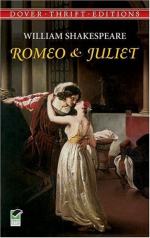|
This section contains 1,594 words (approx. 6 pages at 300 words per page) |

|
Romeo and Juliet
Summary: The play Romeo and Juliet by William Shakespeare is about the dire consequences of allowing emotion to dominate over reason.
"Never was a story of more woe than this of Juliet and her Romeo," is a fitting phrase to the conclusion of the play. It is fitting because the text is truly about woe, which occurs when the characters allow their feelings to take over reason. Romeo, for example, constantly shows this nature in the play, just like the older and fiery-tempered Capulet. Capulet's daughter, Juliet, though younger than Romeo, is at times much more mature than Romeo, but also allows her feels to cloud her judgement; and so does her cousin, Tybalt, who is vengeful and loathes all Montague's. These characters are mere pawns in the tragedy, used by Shakespeare to display the dire consequences of allowing emotion to dominate over reason; and as a result, much woe is felt by all characters.
Romeo, an impulsive youth, is the epitome of allowing emotion to dominate over reason...
|
This section contains 1,594 words (approx. 6 pages at 300 words per page) |

|


